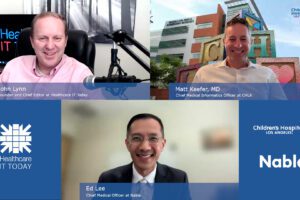Over the past few weeks, there have been numerous articles lambasting states and organizations for continuing to run legacy systems that support unemployment and financial processes. In particular, New Jersey was lambasted for advertising to find help with maintaining their unemployment system written in COBOL. Many of the systems out there that support our daily lives, including banking, credit and debit cards, and accounting, utilize it.
It’s still supported. Micro Focus offers Visual COBOL, which allows developers to leverage Microsoft’s Visual Studio software development environment to build modern COBOL applications. IBM’s latest mainframe offering, the z15, provides a very fast environment to run them in with excellent support for modern encryption and cryptography. If you like Open Source, you can run GNUCobol on Linux and use your editor of choice to write code. The first version of COBOL came out in 1959, 11 years before C, which is the language of choice that many of your applications were developed in, including Windows and MacOS.
The narrative behind this is being utilized to lambaste governments for not keeping systems up to date and current, and for laughing at them for not using good enough technology. It’s part of a long-standing narrative on attacking them perpetuated by people who have their interests in mind, not ours. The real issue is with the sheer volume of unemployment applications. According to CNBC, 26.45 million people have filed for unemployment in the past five weeks. That has erased all job gains since the Great Recession of 2008-2009. The volume of unemployment claims has set records, according to the New York Times, including a record 6.6 million in the week ending April 4 as recorded by the US Department of Labor. This has strained an infrastructure used to dealing with under 2 million claims and low unemployment. COVID-19 and the corresponding furloughs and job loss has strained our system past the point of breakage.
How does this apply to healthcare?
We all want easy solutions to our problems, and something to blame. It’s human nature. Often we look at technology problems and fixate on them as being the issue, not a signal of deeper root causes. People are looking at COBOL as something to blame because there is frustration, anger, and uncertainty over a bad situation compounded by multiple factors. Millions of people who were gainfully employed are now not. We did not have the anticipation of this crisis, or the corresponding supporting people and processes, to deal with this. People call the unemployment centers in their cities, towns, and countries only to find them completely overwhelmed. They feel hopeless and depressed because of this.
We put technologies in to help with improving patient care, patient lives, and the quality of care and service. However, when we put technologies in place that fail or get hacked, we blame them, who implemented them, and the software. We don’t look introspectively enough as to the root causes of these actions, many of which don’t deal with technology. We often put processes and technologies in place without anticipation of scaling them to a very high level quickly. This is why the Electronic Medical Records companies have invested so much into successful go-live methodologies, and why so few are consistently successful.
This crisis has taught us several key lessons. We will deal with the unprecedented, and we will have to improvise and collaborate to deal with these events. The playbooks that we once had, along with the tabletop exercises, are obsolete. The FEMA courses we took didn’t take into account incidents of this magnitude. It has also repeated the lessons that people will look for silver bullets to solve problems and provide simple explanations.
The other one we have learned is that people will repeat what leadership says without critical thinking. We need to be very careful and precise in what we say because people will misinterpret our words, and we have to minimize the magnitude by which they can be. They will also attempt to justify the messaging, even if it is factually wrong, and even at the expense of others. We need to make sure we give precise, accurate, simple, and concise information, and that we deliver it with a consistent level of discipline and empathy.
According to Vox, only 29 percent of eligible jobless Americans received their benefits in March. This means 71 percent did not. The high variety in state laws for who can be considered jobless, combined with people, processes, and technologies not designed for this volume, overwhelm the slim social safety net we have. Healthcare, whether public or private, is part of that. We are directly impacted by this.
As part of this, we have a lot of our population that is susceptible to conspiracy theories and easy explanations that promise a bright future or point blame with no basis in fact. We need to actively combat these statements and help ensure that our friends and family who have started believing these theories receive the right information. We can do this by consistently being empathetic, being good communicators, and acting out of concern. Conspiracy theorists and cult leaders prey on people who are disconnected, depressed, and dejected by promising them easy answers, a better future, and a sympathetic ear for their anger. They manipulate them. We need to reach out and speak with these people and be that sympathetic ear, not the people who promise the visions of an untrue reality.
We need to focus on what we can do, not armchair quarterbacking an overwhelmed system further divided by conflicting state laws or inadvertently amplifying trolls or conspiracy theorists. We should not repeat statements made by those who seek to destroy our common factors and turn us against each other. We’re Americans. We are better than people unified by hatred and derision toward those that are different and empowered to show it by example. We work in healthcare, where we work as a team with purpose to demonstrate excellence and show compassion. We need to ask the question of what we can do rather than think of a funny quip for likes at the expense of the situation, or micro-focusing (no pun intended) on one component like COBOL before laughing it off.
Many of our peers are being furloughed, and millions more now find themselves newly jobless or underemployed. When they need healthcare assistance and help with their complex new reality and corresponding uncertainties, they are coming to us. It is up to us to continue to adapt to an ever-changing situation. We need to keep our mission and values in mind. We need to ensure we provide factual information in a concise way. We will be providing new information and need to adapt to how we do so. We must not repeat or perpetuate falsehoods, even passively. Creativity in how we handle the new financial and social realities for millions with compassion is extremely important. Working with our peers in government who do not have the resources they need to help solve their process and technology issues is important.
Going that extra mile to help the people who trust in us needs to be the norm now, instead of the exception. These are our friends and neighbors. Understanding them, listening, and being truthful and compassionate in our communication while demonstrating excellence is our duty, not perpetuating divisions. Thinking for ourselves with our mission and values in mind toward helping those in need, especially now, is the right thing to do. Making fun of a superficial component of the overall problem is not. We need to especially keep the interests of others in mind now. The days of peacocking and demonstrating that you know more than others or that others are inferior because they have different points of view are gone. Let’s replace them with cooperation, empathy, and understanding.














Very well said…Thank you!
I agree that COBOL is not the specific culprit. However, governments and corporations never build for the maximum possible utilization, only the average that can be purchased as cheaply as possible.
That is why you lack sufficient server space and personnel to accommodate the large volumes that are all too predictable.
Stand up more disk space!
This not about COBOL but about money and the rich who refuse to pay their fair share.
When CEO’s and billionaires languish in prison we will see real change for the better.